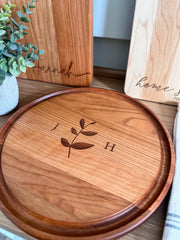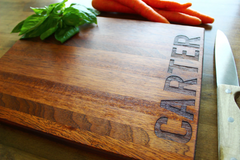SHOP
A column with no settings can be used as a spacer
Link to your collections, sales and even external links
Add up to five columns
SHOP
A column with no settings can be used as a spacer
Link to your collections, sales and even external links
Add up to five columns

Choosing the Perfect Wood for Your Cutting Board: A Guide to Culinary Excellence
February 29, 2024 2 min read
When it comes to preparing delicious meals in the kitchen, having the right tools is essential. One often-overlooked but crucial tool is the cutting board. While there are various materials available, wood remains a popular choice due to its aesthetic appeal, durability, and natural antimicrobial properties. In this guide, we'll explore the best types of wood for cutting boards, helping you make an informed decision for a kitchen essential that not only looks great but also enhances your culinary experience.
- Hardwood Brilliance:
Hardwoods are the preferred choice for cutting boards, thanks to their durability and resistance to wear and tear. Among the top contenders are:

-
Maple: Known for its light color and fine grain, maple is a classic choice. Its tight grain pattern helps resist bacteria penetration, and it's sturdy enough to withstand the rigors of chopping and slicing.

-
Cherry: Cherry wood offers a beautiful reddish-brown hue that deepens with age. It possesses natural antimicrobial properties and is gentle on knife edges, making it an excellent choice for cutting boards.

-
Mahogany: Renowned for its rich, dark color and straight grain, Sapele Mahogany is not only visually appealing but also durable. It has natural resistance to bacteria and fungi, ensuring a safe and sanitary food preparation surface.
- Hickory and White Oak are two more excellent choices that share the proper balance of hardness, durability and antimicrobial properties while expanding the range of gran and color patterns to suit any taste or match any kitchen.
- Antimicrobial Properties:
Wooden cutting boards have natural antimicrobial properties that help inhibit the growth of bacteria. Studies have shown that certain hardwoods, like maple, cherry, hickory and white oak have inherent properties that make them less hospitable to bacteria than plastic or other materials.
The enzymes present in wood, along with its dense and closed grain structure, create an inhospitable environment for bacteria. It's crucial to note that regular cleaning and maintenance are still essential to ensure a hygienic cutting surface.
- Gentle on Knives:
Wooden cutting boards are gentle on knife edges, preserving the sharpness of your blades for a more extended period compared to harder surfaces like glass or granite. This not only enhances the longevity of your knives but also makes for a smoother and more enjoyable chopping experience.
- Maintenance Matters:
Proper maintenance is key to prolonging the life of your wooden cutting board. Regularly oiling the board with food-grade mineral oil or beeswax helps prevent the wood from drying out, cracking, or absorbing odors. Additionally, washing the board with mild soap and warm water after each use and allowing it to air dry is crucial for maintaining hygiene. Avoid submersion in water and never run it through the dishwasher.
In conclusion:
In the world of cutting boards, wood stands out as a timeless and practical choice. The hardwoods we offer here at Sugar Tree Gallery– maple, cherry, mahogany etc.– not only provide a beautiful aesthetic to your kitchen but also offer durability, natural antimicrobial properties, and knife-friendly surfaces. By choosing the right type of wood and incorporating proper maintenance practices, you'll not only elevate your culinary experience but also invest in a kitchen essential that will withstand the test of time. Display it proudly when not in use and showcase the intricate engraving that Sugar Tree Gallery offers.

Join our VIP Club today and get 10% off your first order
Subscribe to our newsletter for sneak peeks at new collections and early access to flash sales!
